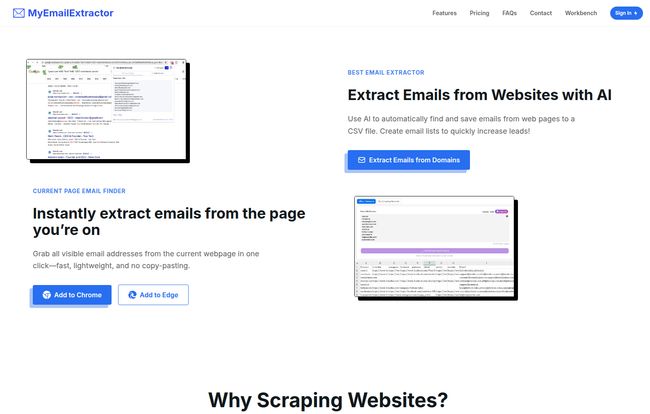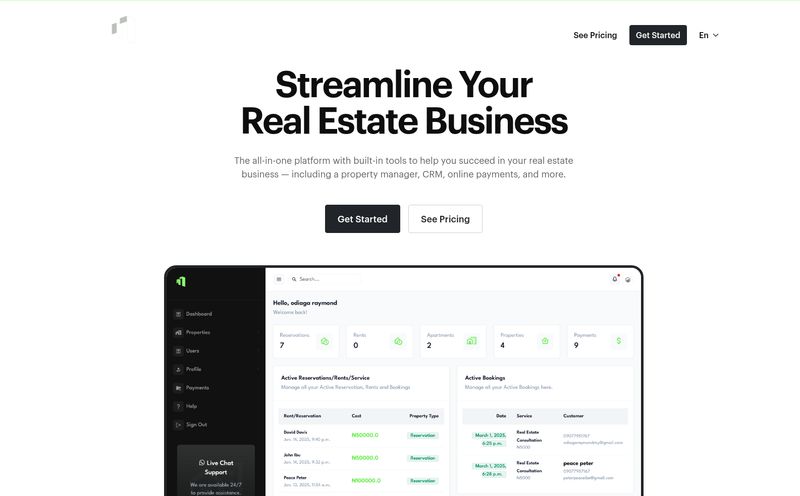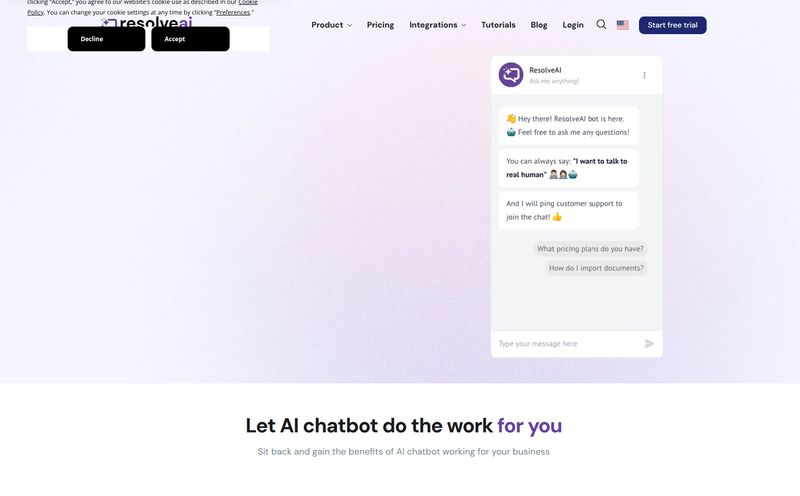If you've ever been in the trenches of digital marketing or sales, you know the grind. I'm talking about the mind-numbing, soul-crushing task of building a solid outreach list. I've been there. I once spent an entire Tuesday—a beautiful, sunny Tuesday I'll never get back—manually combing through websites, squinting at contact pages, and copy-pasting email addresses into a spreadsheet for a link-building campaign. My eyes were burning. It felt like trying to pan for gold with a teaspoon.
So, whenever a new tool pops up promising to automate this drudgery, my ears perk up. But I'm also skeptical. We've all seen them: the clunky, the inaccurate, the 'is-this-even-legal?' email scrapers. They're the wild west of marketing tools. Recently, a tool called MyEmailExtractor crossed my desk, and with its talk of AI and one-click simplicity, I knew I had to take it for a spin. Is it just another tool in the pile, or is it the productivity boost we've been waiting for?
What Exactly is MyEmailExtractor?
In a nutshell, MyEmailExtractor is a web scraping tool that uses AI to automatically find and save contact information from websites. We're not just talking emails. It also sniffs out phone numbers and social media profiles, bundling them all up for you in a neat little CSV file. Think of it as a super-fast research assistant who reads web pages and types the important contact details into a spreadsheet, but without the coffee runs or small talk.
It operates in two main ways. First, there's a lightweight Chrome extension that lets you grab data from the exact page you're currently browsing. See a potential contact on a blog? Click, and it's yours. Second, there's a 'Workbench' feature where you can feed it a specific domain, and it goes on a deeper hunt across that site. It's a simple premise, but as any seasoned SEO knows, the magic is in the execution.
Why You Should Care About Web Scraping (The Right Way)
The term 'web scraping' can sometimes get a bad rap, conjuring images of spambots and shady data harvesting. But when used ethically, it’s an incredibly powerful technique. For us in the SEO and CPC world, it's a game-changer for:
- Targeted Outreach: Building lists for guest posting, PR pitches, or link-building campaigns without spending days on manual labor.
- Market Research: Quickly gathering public contact info from competitors or key players in a new niche. Who are their public-facing people? What social platforms are they on? This is gold.
- Sales & Lead Generation: Obviously. This is the big one. Arming your sales team with accurate, direct contact info instead of generic 'contact@' addresses.
Now, about the elephant in the room: legality. MyEmailExtractor states on their site that scraping public data is protected by the First Amendment. This is a common and generally accepted stance in the industry—if the information is publicly accessible on a website for anyone to see, a bot seeing it isn't fundamentally different. The ethical line, in my opinion, is drawn at what you do with that data. Don't be a spammer. Be a human. Personalize your outreach. Provide value. The Electronic Frontier Foundation (EFF) has covered cases that support this view, which is reassuring for professionals.
Getting Hands-On: How MyEmailExtractor Works
I’m a big believer that a tool's true worth is in its user experience. A powerful tool that's impossible to use is just a frustrating line of code. Thankfully, this isn't the case here.
The "On-the-Fly" Chrome Extension
This is where I started. You add the extension to Chrome (or Edge), visit a webpage, and click the icon. A small window pops up and starts populating with any emails it finds on that page. It's fast. It's simple. There's no complex setup or configuration. For quick, one-off searches, it's fantastic.

Visit MyEmailExtractor
The "Deep Dive" Domain Search
The real power, especially for larger campaigns, is the domain search workbench. You log into their platform, enter a list of websites you want to investigate, and let the AI do its thing. This is far more efficient than visiting each site one by one. It returns a list that you can then export to a CSV, ready to be uploaded to your CRM or mailing platform. This is what would have saved my poor eyes on that fateful Tuesday.
What Kind of Data Are We Talking About?
The output is more than just a list of emails, which is a big plus. You get a surprisingly rich data set. MyEmailExtractor pulls email addresses it finds on the page, but it also identifies and extracts links to various social media profiles. We're talking Facebook, Instagram, LinkedIn, YouTube, Twitter, and even Yelp. This is incredibly useful for building a more complete picture of a contact. It also grabs phone numbers when available and lists the source domain, so you always know where the information came from. Having the social profile alongside an email makes personalizing outreach so much easier.
The Good, The Bad, and The Price Tag
No tool is perfect, so let's break it down. After using MyEmailExtractor for a bit, here are my honest thoughts.
What I Really Liked
The sheer speed and simplicity are the biggest wins. It strips away the complexity and just delivers the data. The fact that it grabs more than just emails is a significant advantage over many basic scrapers. The combo of an email and a LinkedIn profile is often the one-two punch you need for effective B2B outreach. And the AI-powered aspect seems to do a good job of filtering out junk and finding legitimate contacts on cluttered pages.
A Few Things to Keep in Mind
Now for the reality check. The tool's accuracy is entirely dependent on the source data. It's not a magic wand. If an email address isn't publicly visible on the website, this tool isn't going to find it. It doesn't guess email patterns or tap into secret databases. It scrapes what's there, which is what makes it legal, but it also means your results will vary. Some sites will yield a treasure trove; others will come up empty. Also, the free plan is very much a 'try before you buy' deal. With only 5 credits a month, it's enough to see if you like the workflow, but not enough for any real work. You'll need to jump to a paid plan for serious use.
Breaking Down the MyEmailExtractor Pricing
The pricing structure is pretty straightforward, which I appreciate. They offer annual plans that give you a set number of credits for the year.
| Plan | Price | Best For |
|---|---|---|
| Free | $0 / year | Testing the waters. You get 5 credits per month to see how it works. |
| Startup | $119 / year | Freelancers, small businesses, or agencies starting with automated lead gen. It offers 14,000 credits. |
| Enterprise | $539 / year | Large-scale operations and power users who need a massive 200,000 credits and premium support. |
In my view, the Startup plan hits the sweet spot for most users. It provides enough credits for consistent campaign building without a huge financial commitment. The free plan is great, but you'll burn through those 5 credits in about ten minutes if you're anything like me.
My Final Take: Who is This Tool Actually For?
So, who should add MyEmailExtractor to their toolkit? I'd say it's a solid choice for B2B sales teams, SEO agencies building outreach lists, PR professionals, and solo entrepreneurs who wear all the hats. If a significant part of your job involves finding people to talk to online, this will genuinely save you time.
Who is it not for? If you're looking for a tool to find hidden, private email addresses or to build massive, non-permission-based spam lists, this isn't it (and you should probably rethink your strategy anyway). This is a productivity tool for professionals, not a black-hat hacking device.
Frequently Asked Questions About MyEmailExtractor
- 1. Is using MyEmailExtractor legal?
- Yes. The tool extracts data that is already publicly available on websites. The practice of scraping public data is generally considered legal, as affirmed in various court cases. The key is to use the data ethically.
- 2. How accurate is the data it finds?
- The data is as accurate as the source website. Since it scrapes information in real-time, if the email or social link is correct on the website, it will be correct in your export. If the website has outdated info, so will your file.
- 3. Does MyEmailExtractor guess email addresses?
- No, it doesn't guess. It only extracts email addresses that are explicitly written in the website's text or code. It finds what's actually there.
- 4. What kind of websites can it extract from?
- It can work on most public websites, including company pages, blogs, directories, and even social media sites and search engine results pages (SERPs).
- 5. What happens when I run out of credits on a paid plan?
- Your credits are allocated for the year based on your plan. If you use them up, you would typically need to wait for the next billing cycle to renew or contact their support to discuss upgrading your plan.
A Smarter Way to Build Connections
In the end, tools like MyEmailExtractor represent a shift towards smarter, more efficient marketing. They don't replace the human element—you still need to craft a compelling message and build a real connection. What they do is clear the tedious, manual hurdles out of your way, freeing you up to focus on what really matters. For the price of a few cups of coffee a month, the Startup plan can give you back hours of your time. And for me, avoiding another eyeball-searing Tuesday of manual data entry is worth every penny.
Reference and Sources
- MyEmailExtractor Official Website
- MyEmailExtractor Pricing Page
- Electronic Frontier Foundation (EFF): "Scraping Data From the Public Web is Legal"



